Dec 19, 2019 | Current Events
Post developed by Katherine Pearson
Since its establishment in 2013, a total of 168 posts have appeared on the Center for Political Studies (CPS) Blog. As we approach the new year, we look back at the most popular topics of 2019. Listed below are the recent posts that you found most interesting on the blog this year.
1. Political Communication Meets Big Data
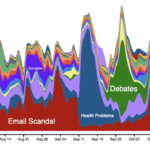 How do voters make sense of the information they hear about candidates in the news and through social media? This question was at the heart of a collaboration between researchers at the University of Michigan, Georgetown University, and Gallup to study political communication that took place during the 2016 U.S. presidential election. Results from the project will be published in a new book, Words That Matter, in May 2020.
How do voters make sense of the information they hear about candidates in the news and through social media? This question was at the heart of a collaboration between researchers at the University of Michigan, Georgetown University, and Gallup to study political communication that took place during the 2016 U.S. presidential election. Results from the project will be published in a new book, Words That Matter, in May 2020.
Read the post
2. New Book Examines Ghana’s Political Trap
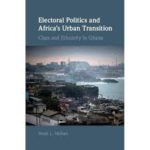 In his new book, Electoral Politics and Africa’s Urban Transition, Noah Nathan traces the unexpected political patterns that are emerging in urban Ghana. Despite a growing middle class and increasing ethnic diversity, clientelism and ethnic voting persist in many urban neighborhoods.
In his new book, Electoral Politics and Africa’s Urban Transition, Noah Nathan traces the unexpected political patterns that are emerging in urban Ghana. Despite a growing middle class and increasing ethnic diversity, clientelism and ethnic voting persist in many urban neighborhoods.
Read the post
3. Divided by Culture: Partisan Imagery and Political Evaluations
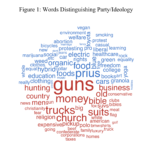 Increasingly, Americans associate partisan leanings with otherwise non-political objects. Dan Hiaeshutter-Rice, Fabian G. Neuner, and Stuart Soroka examine the consequences of these associations in their paper “Divided by Culture: Partisan Imagery and Political Evaluations”, which they presented at the Midwest Political Science Association meeting on Saturday, April 6, 2019.
Increasingly, Americans associate partisan leanings with otherwise non-political objects. Dan Hiaeshutter-Rice, Fabian G. Neuner, and Stuart Soroka examine the consequences of these associations in their paper “Divided by Culture: Partisan Imagery and Political Evaluations”, which they presented at the Midwest Political Science Association meeting on Saturday, April 6, 2019.
Read the post
4. Angela Ocampo Examines the Importance of Belonging
 The idea of belonging, or attaining inclusion, is the centerpiece of Angela Ocampo’s research. Her dissertation received the American Political Science Association’s (APSA) Race and Ethnic Politics Section’s award for the best dissertation in the field at the Fall 2019 APSA meetings.
The idea of belonging, or attaining inclusion, is the centerpiece of Angela Ocampo’s research. Her dissertation received the American Political Science Association’s (APSA) Race and Ethnic Politics Section’s award for the best dissertation in the field at the Fall 2019 APSA meetings.
Read the post
5. Computer simulations reveal partisan gerrymandering
 Jowei Chen developed a new way to analyze legislative districts and determine whether they have been unfairly gerrymandered for partisan reasons. Chen, an Associate Professor of Political Science and a Research Associate at the Center for Political Studies, used computer simulations to produce non-partisan districting plans that follow traditional districting criteria.
Jowei Chen developed a new way to analyze legislative districts and determine whether they have been unfairly gerrymandered for partisan reasons. Chen, an Associate Professor of Political Science and a Research Associate at the Center for Political Studies, used computer simulations to produce non-partisan districting plans that follow traditional districting criteria.
Read the post
6. Improving Research on Subnational Violence with xSub
 xSub, a new freely available resource, builds the infrastructure to compare data on political conflicts and violence at a subnational level (i.e., states, cities, and villages). This database of databases allows researchers to construct custom, analysis-ready datasets. xSub includes data on conflicts in 156 countries, from 21 sources.
xSub, a new freely available resource, builds the infrastructure to compare data on political conflicts and violence at a subnational level (i.e., states, cities, and villages). This database of databases allows researchers to construct custom, analysis-ready datasets. xSub includes data on conflicts in 156 countries, from 21 sources.
Read the post
7. Portrait of a birther: White conservatives with political knowledge more likely to believe Obama conspiracy
 White conservatives who not only have racial animus but are also knowledgeable about politics were the most likely group to believe that former President Barack Obama was not born in the United States, according to a University of Michigan Institute for Social Research study.
White conservatives who not only have racial animus but are also knowledgeable about politics were the most likely group to believe that former President Barack Obama was not born in the United States, according to a University of Michigan Institute for Social Research study.
Read the post
8. Racial Dynamics in the American Context
: A Second Century of Civil Rights and Protest?
 Drawing from published work that will be compiled as a new book, Black Politics After the Civil Rights Revolution, Dianne Pinderhughes explored the arc of 20th-century civil rights reform and the growing political incorporation of African Americans into electoral politics when she delivered the 2019 Hanes Walton, Jr. lecture.
Drawing from published work that will be compiled as a new book, Black Politics After the Civil Rights Revolution, Dianne Pinderhughes explored the arc of 20th-century civil rights reform and the growing political incorporation of African Americans into electoral politics when she delivered the 2019 Hanes Walton, Jr. lecture.
Read the post
9. Toward a Typology of Populists
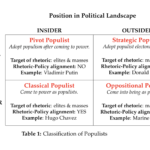 The rise in populism around the world has received much attention, but not all populists are the same. In a new paper, Pauline Jones and Anil Menon present an original typology of populists that goes beyond typical left-wing versus right-wing classifications.
The rise in populism around the world has received much attention, but not all populists are the same. In a new paper, Pauline Jones and Anil Menon present an original typology of populists that goes beyond typical left-wing versus right-wing classifications.
Read the post
10. Incidental Exposure to Political News Increases Political Knowledge
 We’re immersed in a media landscape full of choices. News, information, and entertainment are all at our fingertips. But does this mean that people are better informed about important issues? Brian Weeks, Daniel S. Lane, Lauren B. Potts, and Nojin Kwak conducted two surveys to answer this question.
We’re immersed in a media landscape full of choices. News, information, and entertainment are all at our fingertips. But does this mean that people are better informed about important issues? Brian Weeks, Daniel S. Lane, Lauren B. Potts, and Nojin Kwak conducted two surveys to answer this question.
Read the post
Dec 11, 2019 | Current Events, Policy, Profile, Race, Social Policy, Uncategorized
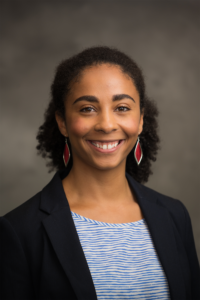
Shea Streeter
Post developed by Katherine Pearson
Shea Streeter began her graduate work in political science as a comparativist interested in state repression around the world. When the protest movement in Ferguson, Missouri exploded after the killing of Michael Brown, Streeter turned her attention to police violence and protest in the United States. As a President’s Postdoctoral Fellow at the University of Michigan, she’s examining how race and gender shape the ways that people experience, perceive, and respond to incidents of violence.
“Racial animus is in the air we breathe,” Streeter says, “but when we look at police violence, we can get distracted by race and ignore other important factors.” Her dissertation included an experiment to examine how the race of victims of police violence determines whether the public sees the violence as just. Surprisingly, she finds that the race of the victims is less salient than expected. Instead, the social context strongly shaped the attitudes of the respondents. Those who were predisposed to consider societal and institutional forces were less likely to believe the victim deserved the outcome, compared to respondents who place sole responsibility on the individual.
Racial differences in rates of protest
Half of the people killed by police each year are white, and yet the rate of protest over white victims of police violence is very low. A dataset that Streeter is currently completing includes all publicly available information on police killings and any protests that happened in 2015-2016. For those two years, about a third of the police killings of African Americans led to some sort of protest, but when whites were killed by police, protests occurred only five percent of the time. “I argue that it’s the biggest racial gap related to policing,” Streeter says. “There are a lot of reasons we could point to why African Americans would be protesting. But why wouldn’t whites also be protesting when their community members are killed?”
When conducting field research in several different cities in the United States, Streeter asked community organizers about protests for white victims of police violence. The organizers told her that they reach out to the families of white victims, but those families often do not want to be involved with protests. Instead, many white family members express understanding and forgiveness toward the police. Streeter makes sense of these reactions by tying them to the psychological concept of a belief in a just world. The idea is that people get what they deserve and they deserve what they get. Streeter observes that even when people who hold this belief lose a member of their own family, their trust in the police remains unchanged. “If you have these beliefs, it can be like a double loss,” Streeter notes, which may explain why there are fewer protests for white victims of police violence.
The role of mentorship
Mentorship has played a large role in Streeter’s academic career. Christian Davenport became a mentor to her when she was a senior at Notre Dame. At that time, Streeter was thinking about her career but hadn’t considered pursuing research. While working as a research assistant for Davenport, he encouraged her to pursue graduate work in political science. Streeter cites this support as a key reason she decided to come to the University of Michigan. She also gives credit to David Laitin and Jeremy Weinstein at Stanford, who pushed her to study the United States when she was training as a comparativist. “I had confusion about what my identity as a scholar would be if I changed paths, but they put my fears to rest, so I give them a lot of credit for helping me pursue this research path,” Streeter says.
Looking forward
In addition to her ongoing research on police violence, Streeter is turning her attention to the ways interpersonal violence affects the way that people think and act politically. She sees connections between different types of violence, including mass shootings, domestic violence, and suicide. “We don’t often see these as political violence, but they affect how people operate in the world,” Streeter says. She’s especially interested in the ways violence affects people differently based on gender. Streeter’s work is innovative and varied, but united by a common theme, which she sums up as “How does violence affect our world, and what are the aggregate consequences of that? That’s the big picture.”
 How do voters make sense of the information they hear about candidates in the news and through social media? This question was at the heart of a collaboration between researchers at the University of Michigan, Georgetown University, and Gallup to study political communication that took place during the 2016 U.S. presidential election. Results from the project will be published in a new book, Words That Matter, in May 2020.
How do voters make sense of the information they hear about candidates in the news and through social media? This question was at the heart of a collaboration between researchers at the University of Michigan, Georgetown University, and Gallup to study political communication that took place during the 2016 U.S. presidential election. Results from the project will be published in a new book, Words That Matter, in May 2020. In his new book, Electoral Politics and Africa’s Urban Transition, Noah Nathan traces the unexpected political patterns that are emerging in urban Ghana. Despite a growing middle class and increasing ethnic diversity, clientelism and ethnic voting persist in many urban neighborhoods.
In his new book, Electoral Politics and Africa’s Urban Transition, Noah Nathan traces the unexpected political patterns that are emerging in urban Ghana. Despite a growing middle class and increasing ethnic diversity, clientelism and ethnic voting persist in many urban neighborhoods. Increasingly, Americans associate partisan leanings with otherwise non-political objects. Dan Hiaeshutter-Rice, Fabian G. Neuner, and Stuart Soroka examine the consequences of these associations in their paper “Divided by Culture: Partisan Imagery and Political Evaluations”, which they presented at the Midwest Political Science Association meeting on Saturday, April 6, 2019.
Increasingly, Americans associate partisan leanings with otherwise non-political objects. Dan Hiaeshutter-Rice, Fabian G. Neuner, and Stuart Soroka examine the consequences of these associations in their paper “Divided by Culture: Partisan Imagery and Political Evaluations”, which they presented at the Midwest Political Science Association meeting on Saturday, April 6, 2019. The idea of belonging, or attaining inclusion, is the centerpiece of Angela Ocampo’s research. Her dissertation received the American Political Science Association’s (APSA) Race and Ethnic Politics Section’s award for the best dissertation in the field at the Fall 2019 APSA meetings.
The idea of belonging, or attaining inclusion, is the centerpiece of Angela Ocampo’s research. Her dissertation received the American Political Science Association’s (APSA) Race and Ethnic Politics Section’s award for the best dissertation in the field at the Fall 2019 APSA meetings. Jowei Chen developed a new way to analyze legislative districts and determine whether they have been unfairly gerrymandered for partisan reasons. Chen, an Associate Professor of Political Science and a Research Associate at the Center for Political Studies, used computer simulations to produce non-partisan districting plans that follow traditional districting criteria.
Jowei Chen developed a new way to analyze legislative districts and determine whether they have been unfairly gerrymandered for partisan reasons. Chen, an Associate Professor of Political Science and a Research Associate at the Center for Political Studies, used computer simulations to produce non-partisan districting plans that follow traditional districting criteria. xSub, a new freely available resource, builds the infrastructure to compare data on political conflicts and violence at a subnational level (i.e., states, cities, and villages). This database of databases allows researchers to construct custom, analysis-ready datasets. xSub includes data on conflicts in 156 countries, from 21 sources.
xSub, a new freely available resource, builds the infrastructure to compare data on political conflicts and violence at a subnational level (i.e., states, cities, and villages). This database of databases allows researchers to construct custom, analysis-ready datasets. xSub includes data on conflicts in 156 countries, from 21 sources. White conservatives who not only have racial animus but are also knowledgeable about politics were the most likely group to believe that former President Barack Obama was not born in the United States, according to a University of Michigan Institute for Social Research study.
White conservatives who not only have racial animus but are also knowledgeable about politics were the most likely group to believe that former President Barack Obama was not born in the United States, according to a University of Michigan Institute for Social Research study. Drawing from published work that will be compiled as a new book, Black Politics After the Civil Rights Revolution, Dianne Pinderhughes explored the arc of 20th-century civil rights reform and the growing political incorporation of African Americans into electoral politics when she delivered the 2019 Hanes Walton, Jr. lecture.
Drawing from published work that will be compiled as a new book, Black Politics After the Civil Rights Revolution, Dianne Pinderhughes explored the arc of 20th-century civil rights reform and the growing political incorporation of African Americans into electoral politics when she delivered the 2019 Hanes Walton, Jr. lecture. The rise in populism around the world has received much attention, but not all populists are the same. In a new paper, Pauline Jones and Anil Menon present an original typology of populists that goes beyond typical left-wing versus right-wing classifications.
The rise in populism around the world has received much attention, but not all populists are the same. In a new paper, Pauline Jones and Anil Menon present an original typology of populists that goes beyond typical left-wing versus right-wing classifications. We’re immersed in a media landscape full of choices. News, information, and entertainment are all at our fingertips. But does this mean that people are better informed about important issues? Brian Weeks, Daniel S. Lane, Lauren B. Potts, and Nojin Kwak conducted two surveys to answer this question.
We’re immersed in a media landscape full of choices. News, information, and entertainment are all at our fingertips. But does this mean that people are better informed about important issues? Brian Weeks, Daniel S. Lane, Lauren B. Potts, and Nojin Kwak conducted two surveys to answer this question.

